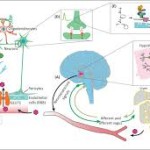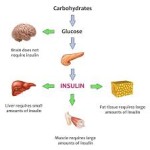 Blood sugar becomes elevated when we eat foods that are rich in sugars and carbohydrates. In the past carbs were classified as simple or complex. Complex carbs include fruits, vegetables, grains, breads and pastas. Simple carbs are foods that have refined sugars in them like cakes, candy, cookies and pies. In both cases your body interprets the chemicals in a similar fashion and the by-product, blood glucose, is dumped into the bloodstream through the intestines.
Blood sugar becomes elevated when we eat foods that are rich in sugars and carbohydrates. In the past carbs were classified as simple or complex. Complex carbs include fruits, vegetables, grains, breads and pastas. Simple carbs are foods that have refined sugars in them like cakes, candy, cookies and pies. In both cases your body interprets the chemicals in a similar fashion and the by-product, blood glucose, is dumped into the bloodstream through the intestines.
There is a difference in the nutritional value of candy and fruit, but both will spike your blood sugar. Today, doctors can differentiate the amount of metabolized sugar from foods by also taking into account any processing of the food, the form, fiber content and fat content. All of these will either increase or decrease the amount of blood glucose that results from eating the food and is called the glycemic index.
As your blood sugar rises, the pancreas will produce insulin. This hormone is used to transport the blood glucose across the cell membranes for the cells to use for energy. Excess glucose is stored in the liver as glycogen. If the liver storage is full then the excess sugar becomes triglycerides for storage in the body.
In this way, blood sugar spikes encourage the body to use carbs and sugar for energy and at the same time will increase the storage of fats and fatty acids. The body will use the stored fat for energy at a time when it doesn’t have glucose.
However, once the blood glucose has been used – either for energy or stored – your blood sugar will drop. This drop will often precipitate cravings for carbohydrates and an increase in hunger.
Both the storage of fat and increased hunger levels will reduce the potential for success in any weight loss regimen. If weight loss was the only reason to steer clear of high carbohydrate meals, it would be a great reason.
But, blood sugar spikes also increase the inflammatory process in the body through the release of inflammation cytokines. The combination of both the manufacture of triglycerides and inflammation significantly increase the risk of athrosclerotic plaques in the arteries – the precursor to cardiovascular disease.
In a study released in 2012, researchers found even more disturbing information. Even slightly higher levels of glucose will noticeably increase the risk of ischemic heart disease. (1) These results were from patients who were NOT diabetic.
You can make a difference in your blood sugar spike by watching your food intake and by taking a short 15 minute walk after each meal. In a study published by the American Heart Association, researchers found that people who were at risk for impaired glucose control had lower blood sugar results and less spikes when they took a 15 minute walk after each meal. (2)
References:
(1) University of Copenhagen: Slightly elevated blood glucose levels increase risk of heart disease
(2) American Diabetes Association: Three 15 minute bouts of moderate post meal walking significantly improves 24-h glycemic control in older people at risk for impaired glucose tolerance
http://care.diabetesjournals.org/content/early/2013/06/03/dc13-0084.abstract
Resources:
Journal of American College of Cardiology: Association between elevated blood glucose and outcome in acute heart failure
http://www.ncbi.nlm.nih.gov/pubmed/23333145
Johns Hopkins: High Blood Sugar levels a risk for heart disease
http://www.jhsph.edu/news/news-releases/2005/selvin-bloodsugar.html
Harvard: Carbohydrates and Blood Sugar
http://www.hsph.harvard.edu/nutritionsource/carbohydrates/carbohydrates-and-blood-sugar/
Everyday Health: What You need to know about blood sugar spikes
http://www.everydayhealth.com/sanjay-gupta/what-you-need-to-know-about-blood-sugar-spikes.aspx
Men’s Health: The Truth About Sugar
http://www.menshealth.com/mhlists/sugar_facts/avoid_blood_sugar_spikes.php
Authority Nutrition: 6 Ways “Heart Healthy” whole Wheat can destroy your health
http://authoritynutrition.com/6-ways-wheat-can-destroy-your-health/
American Heart Journal: Impaired glucose tolerance and cardiovascular disease
http://www.ncbi.nlm.nih.gov/pubmed/15131534
Healthline: A short walk after meals is all it takes to lower blood sugar
http://www.healthline.com/health-news/aging-walking-after-meals-to-control-blood-sugar-spikes-061213


Leave a Reply